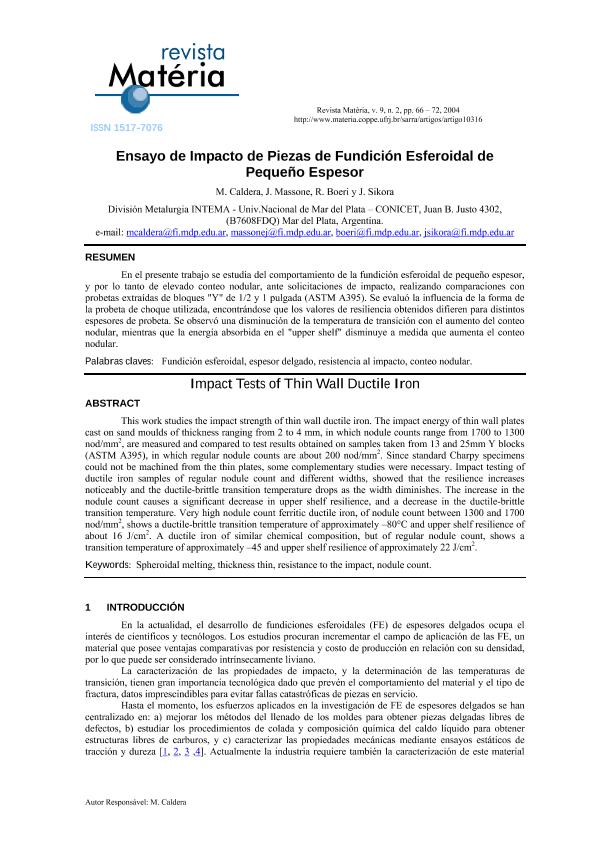Mostrar el registro sencillo del ítem
dc.contributor.author
Caldera, Martin

dc.contributor.author
Massone, Juan Miguel

dc.contributor.author
Boeri, Roberto Enrique

dc.contributor.author
Sikora, Jorge Antonio

dc.date.available
2020-03-06T19:01:21Z
dc.date.issued
2004-12
dc.identifier.citation
Caldera, Martin; Massone, Juan Miguel; Boeri, Roberto Enrique; Sikora, Jorge Antonio; Ensayo de impacto de piezas de fundición esferoidal de pequeño espesor; Universidade Federal do Rio de Janeiro; Matéria; 9; 2; 12-2004; 66-72
dc.identifier.issn
1517-7076
dc.identifier.uri
http://hdl.handle.net/11336/98965
dc.description.abstract
En el presente trabajo se estudia del comportamiento de la fundición esferoidal de pequeño espesor, y por lo tanto de elevado conteo nodular, ante solicitaciones de impacto, realizando comparaciones con probetas extraídas de bloques "Y" de 1/2 y 1 pulgada (ASTM A395). Se evaluó la influencia de la forma de la probeta de choque utilizada, encontrándose que los valores de resiliencia obtenidos difieren para distintos espesores de probeta. Se observó una disminución de la temperatura de transición con el aumento del conteo nodular, mientras que la energía absorbida en el "upper shelf" disminuye a medida que aumenta el conteo nodular.
dc.description.abstract
This work studies the impact strength of thin wall ductile iron. The impact energy of thin wall plates cast on sand moulds of thickness ranging from 2 to 4 mm, in which nodule counts range from 1700 to 1300 nod/mm2, are measured and compared to test results obtained on samples taken from 13 and 25mm Y blocks (ASTM A395), in which regular nodule counts are about 200 nod/mm2. Since standard Charpy specimens could not be machined from the thin plates, some complementary studies were necessary. Impact testing of ductile iron samples of regular nodule count and different widths, showed that the resilience increases noticeably and the ductile-brittle transition temperature drops as the width diminishes. The increase in the nodule count causes a significant decrease in upper shelf resilience, and a decrease in the ductile-brittle transition temperature. Very high nodule count ferritic ductile iron, of nodule count between 1300 and 1700 nod/mm2, shows a ductile-brittle transition temperature of approximately –80°C and upper shelf resilience of about 16 J/cm2. A ductile iron of similar chemical composition, but of regular nodule count, shows a transition temperature of approximately –45 and upper shelf resilience of approximately 22 J/cm2.
dc.format
application/pdf
dc.language.iso
spa
dc.publisher
Universidade Federal do Rio de Janeiro

dc.rights
info:eu-repo/semantics/openAccess
dc.rights.uri
https://creativecommons.org/licenses/by-nc-sa/2.5/ar/
dc.subject
Fundición esferoidal
dc.subject
Espesor delgado
dc.subject
Resistencia al impacto
dc.subject
Conteo nodular
dc.subject
Spheroidal melting
dc.subject
Thickness thin
dc.subject
Resistance to the impact
dc.subject
Nodule count
dc.subject.classification
Otras Ingenierías y Tecnologías

dc.subject.classification
Otras Ingenierías y Tecnologías

dc.subject.classification
INGENIERÍAS Y TECNOLOGÍAS

dc.title
Ensayo de impacto de piezas de fundición esferoidal de pequeño espesor
dc.title
Impact tests of thin wall ductile iron
dc.type
info:eu-repo/semantics/article
dc.type
info:ar-repo/semantics/artículo
dc.type
info:eu-repo/semantics/publishedVersion
dc.date.updated
2020-01-30T14:58:07Z
dc.journal.volume
9
dc.journal.number
2
dc.journal.pagination
66-72
dc.journal.pais
Brasil

dc.journal.ciudad
Rio de Janeiro
dc.description.fil
Fil: Caldera, Martin. Consejo Nacional de Investigaciones Científicas y Técnicas. Centro Científico Tecnológico Conicet - Mar del Plata. Instituto de Investigaciones en Ciencia y Tecnología de Materiales. Universidad Nacional de Mar del Plata. Facultad de Ingeniería. Instituto de Investigaciones en Ciencia y Tecnología de Materiales; Argentina
dc.description.fil
Fil: Massone, Juan Miguel. Consejo Nacional de Investigaciones Científicas y Técnicas. Centro Científico Tecnológico Conicet - Mar del Plata. Instituto de Investigaciones en Ciencia y Tecnología de Materiales. Universidad Nacional de Mar del Plata. Facultad de Ingeniería. Instituto de Investigaciones en Ciencia y Tecnología de Materiales; Argentina
dc.description.fil
Fil: Boeri, Roberto Enrique. Consejo Nacional de Investigaciones Científicas y Técnicas. Centro Científico Tecnológico Conicet - Mar del Plata. Instituto de Investigaciones en Ciencia y Tecnología de Materiales. Universidad Nacional de Mar del Plata. Facultad de Ingeniería. Instituto de Investigaciones en Ciencia y Tecnología de Materiales; Argentina
dc.description.fil
Fil: Sikora, Jorge Antonio. Consejo Nacional de Investigaciones Científicas y Técnicas. Centro Científico Tecnológico Conicet - Mar del Plata. Instituto de Investigaciones en Ciencia y Tecnología de Materiales. Universidad Nacional de Mar del Plata. Facultad de Ingeniería. Instituto de Investigaciones en Ciencia y Tecnología de Materiales; Argentina
dc.journal.title
Matéria

dc.relation.alternativeid
info:eu-repo/semantics/altIdentifier/url/http://www.materia.coppe.ufrj.br/sarra/artigos/artigo10316/
Archivos asociados
